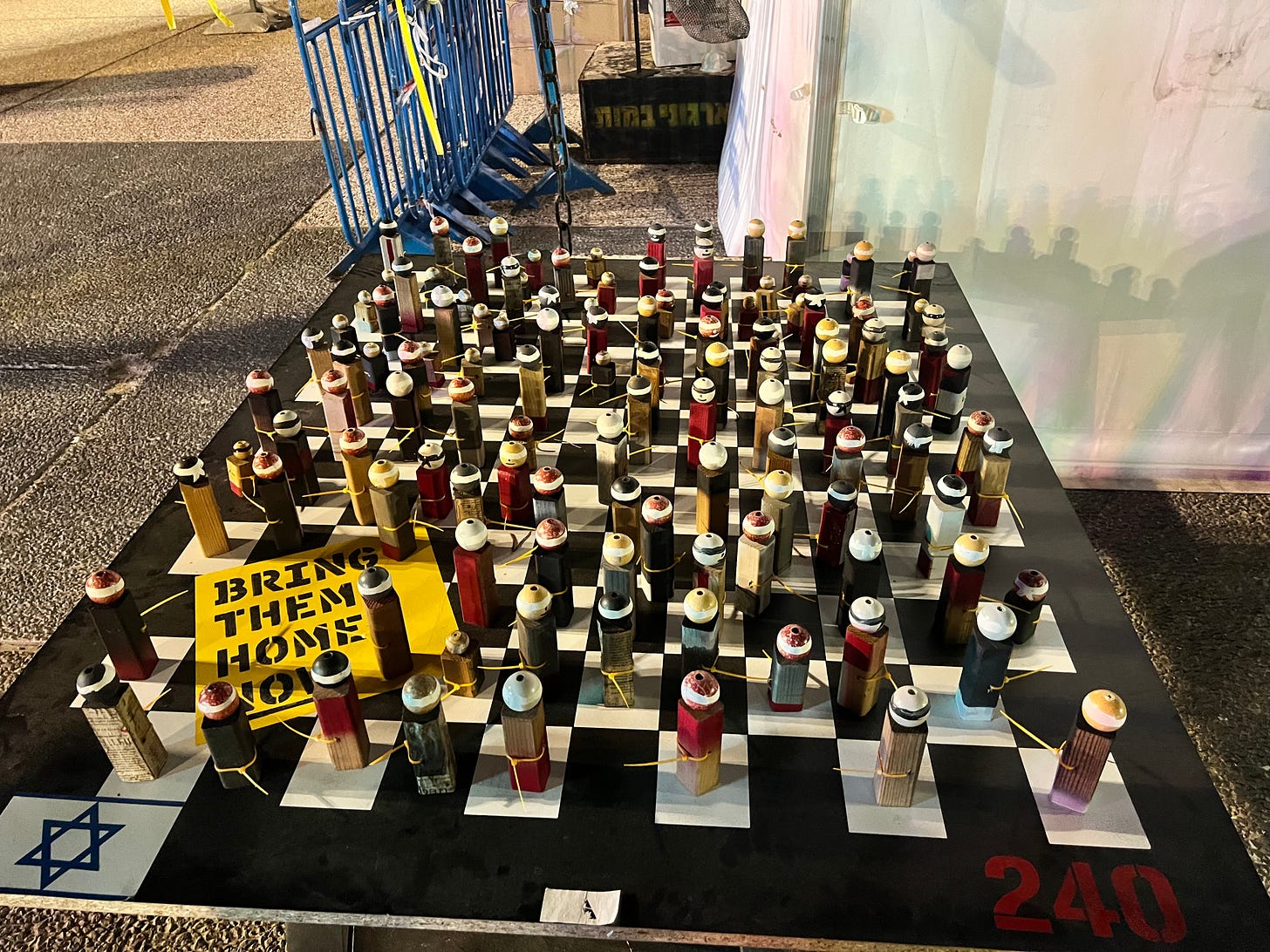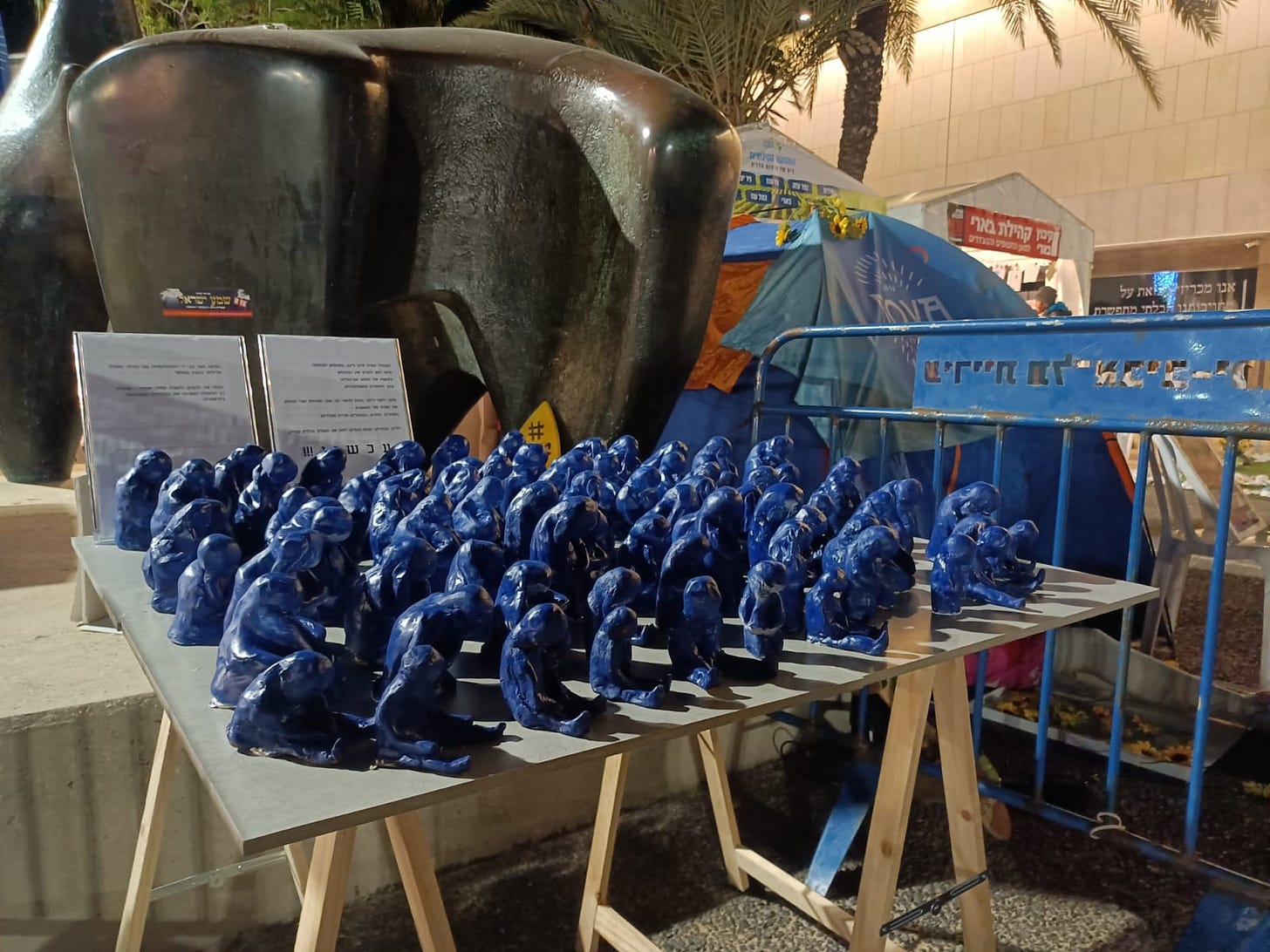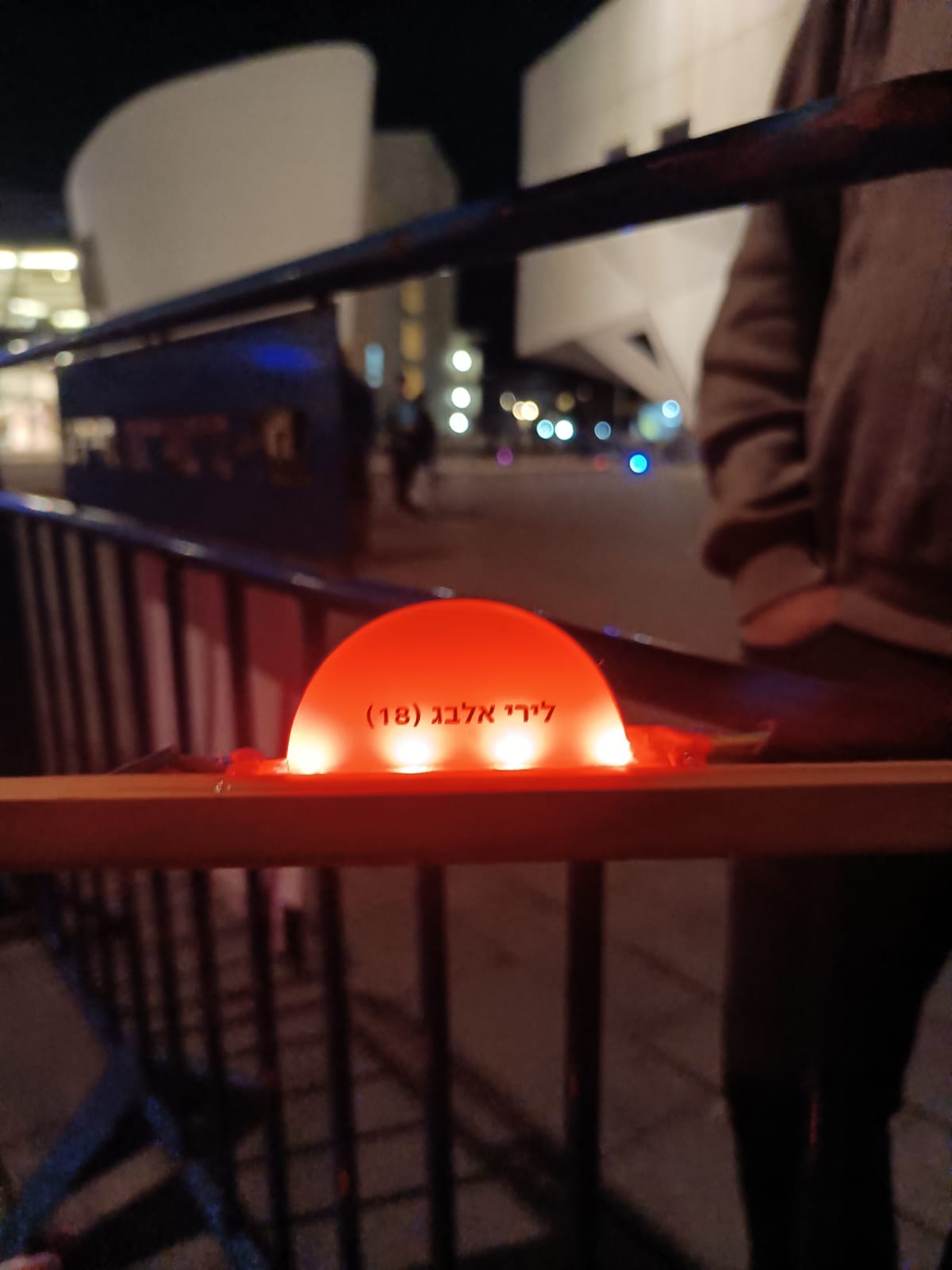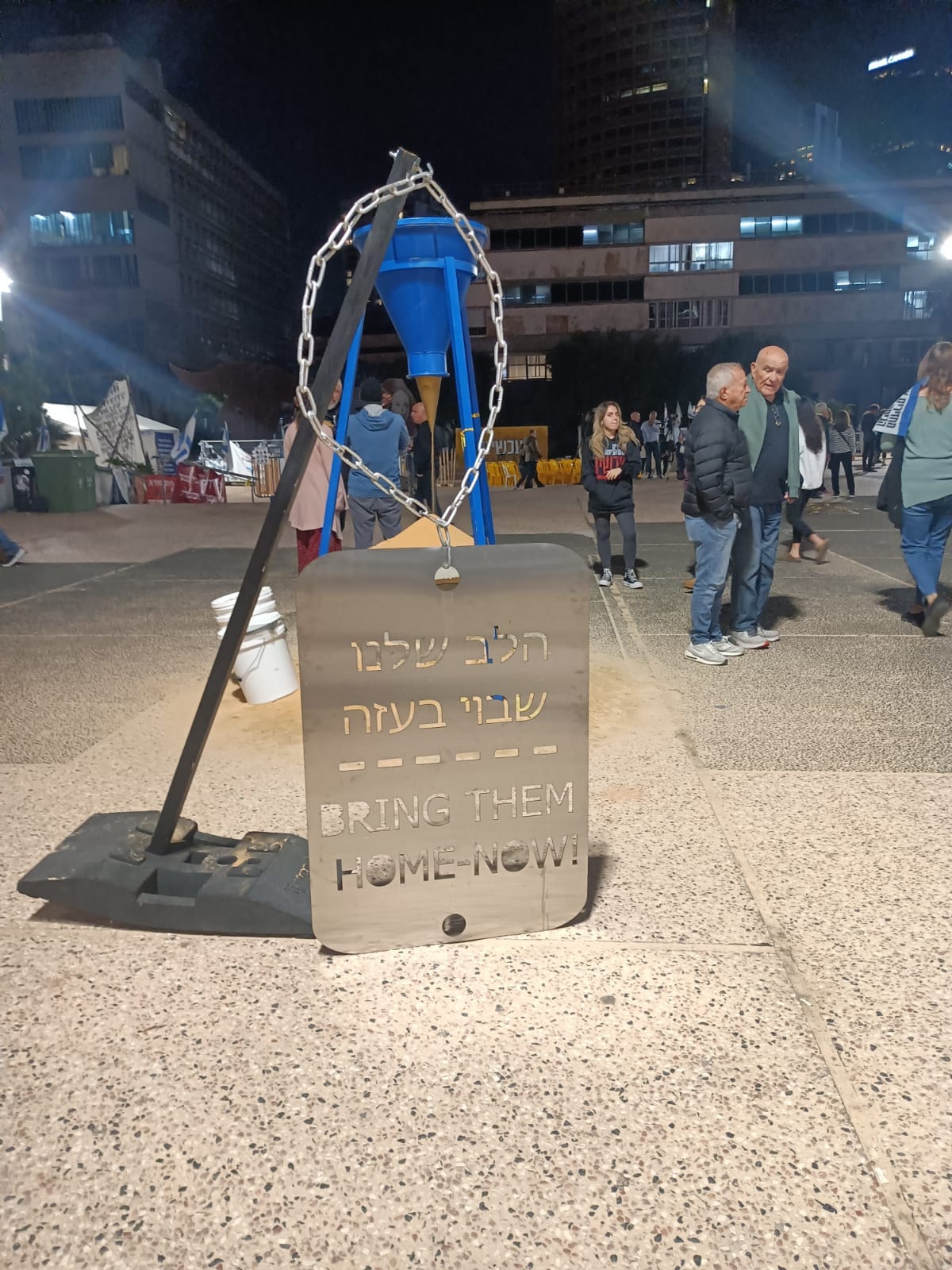Attempting to articulate the experience of loss feels like a landscape of shattered emotions and unspoken sorrows. Words, inadequate vessels of the weight of grief, strain against the enormity of the pain endured by those whose lives have been gutted and changed forever. Each word, a heavy burden, struggles to convey the anguish etched in the heart and souls of people I call my own.
In coming to Israel, my purpose goes beyond mere presence. I am here not only to support my friend but also to intimately connect with the deep ache that courses through the veins of my people. This journey becomes a personal odyssey, a quest to comprehend the layers of emotion, history and solidarity that weave together forming an intricate fabric of our shared narrative.
“I need to go to Hostages Square before I leave,” I implored.
"Chellie, I'm not sure I can do that." A heavy sigh escaped her, carrying the weight of reluctance and the evident discomfort of disappointing me.
I hesitated for a moment, unsure of my ability to proceed. A heavy silence hung in the air, punctuated by a deep sigh that seemed to carry the weight of unspoken emotions. Then, with newfound determination, she spoke again, assuring me, “Okay, I'll go with you. I understand how crucial this is, and we'll face it together. I would not be going there if not for you.” We decided we would go the following day.
We strolled up the street toward Hostages Square, the public plaza that lay before the Tel Aviv Museum of Art. Confirmation of our path came as a sea of somber faces approached us, signaling that we were heading in the right direction.
“I think this is going to be very tough, ” I said as I turned my head to look at her.
Linking my arm with Jennifer's, we provided each other with support, bracing ourselves for the uncertainty ahead. The roads were barricaded, allowing smooth pedestrian flow. Protesters, armed with signs and megaphones, voiced their grievances against Benjamin Netanyahu. The nation simmered with justified anger. The police presence ensured order among the demonstrators, maintaining a safe perimeter for the surrounding crowd. In this democratic society, we cherish the right to speak out, and living here means everyone has the liberty to express their opinions, even if those opinions, views and values are in opposition to the Prime Minister.
A palpable energy surged through our bodies, stirring a mix of fear, wonder, and a profound sadness that draped the area. The atmosphere was laden with a weighty intensity, saturated with grief, anger, and burdensome emotions. This wasn't the Tel Aviv I had experienced back in 2017 when the prospect of making aliyah filled my thoughts. Making aliyah, a fundamental aspect of Zionism, was a choice I had been in the process of making due to a profound connection to my faith, people, and culture.
Back then, I encountered individuals who radiated joy, happiness, and a sense of peace. Now, the pain I sense is a shared pain, a collective burden that weighs heavy. I ache with a deep pain in my soul in solidarity with them. These are my people, and it could have been me, or someone I love.
Upon entering, the initial exhibit featured a lengthy Shabbat table meticulously set for the 129 hostages who remain missing. Some chairs bore photographs, while others stood empty. Each vacant chair symbolized not just a person but a mother, father, son, daughter, sister, brother, aunt, uncle, grandparent, a beloved individual. The emptiness of those seats resonated with a profound void, an absence that words find challenging to encapsulate.
After capturing the moment in a photograph, I observed Jennifer frozen, unable to move. Tears welled up, and she succumbed to an overwhelming wave of emotional paralysis. Fixing my gaze on her, I made my way over, enveloping her in my arms—a cocoon of love and safety—as the intensity of her pain poured out. In the vast tapestry of human existence, every individual deserves the solace of a loving embrace, a fundamental expression of compassion and connection. We stood there, holding one another until it felt safe to let go.
The Shabbat table, once a symbol of family, love, and connection, transformed into one of the most somber exhibits. The notion of a complete family, gathered around the table, felt painfully distant. Many families will never experience that wholeness again.
The realization hits hard: It could have been you. The exhibit's simplicity is effective in conveying its message. A small mirror, with the stark caption "Kidnapped." As I looked into the mirror, the harsh reality and terror struck me, and my body shuddered with the gravity of what could have been or could be one day.
“Would you like me to take a picture of you?”
I noticed tears welling up in Jennifer’s eyes. A hushed “yes” escaped her mouth.
As I write these words, gazing into my dear friend's eyes, I grapple with my inability to ease the pain, anguish, and fear that she, and many others, carry. Yet, in her eyes, I witness not only the weight of suffering but also the profound strength and resilience she harbors.
We continued walking around when I noticed a large white tent.
“Can we go there next?” I pointed to the tent.
Jennifer shook her head.
Inside, portraits of every hostage known to us adorned the space. Stepping into the white tent, an immediate shift in energy enveloped me. Similar to Jennifer's reaction to the previous exhibit, I too found myself rendered motionless. The air inside felt heavy, and warm, shrouding the space with an almost tangible presence. The atmosphere within felt almost sacred.
Standing on the periphery of this charged space, I sensed an unspoken reverence that made it impossible for me to consider taking a photograph. It felt like an intrusion into a deeply personal space.
Overwhelmed, I stood still, and with a heavy heart, I whispered to Jennifer, "it's my turn." My body trembled on the inside, and a wave of intense heat flooded me. My throat tightened, and my jaw clenched. Tears streamed down my face, and she, understanding, wrapped her arm around me. Two hundred and forty hostages. Each with a story, a family, a life. In a moment, a flash, everything changed. It was as though I was feeling their pain in that moment. Together, we moved through the tent, giving each portrait the solemn attention it deserved.
We walked around and saw various exhibits. Each with a strong and profound message…BRING THEM HOME NOW!
Below: Running out of time.
This exhibit is incredibly powerful. Despite the absence of pictures, the impact is profound as each frame bears the name of a hostage. The names light up in either red or white, conveying the stark distinction between those still captive and those who have been freed.
Amidst this emotional journey, we paused at one booth dedicated to the kibbutzim. Here, we encountered a beautiful display of hand painted stones. Jennifer and I were drawn to them, each of us picking up a few, perhaps finding a small tangible connection to hold onto amid the weight of the experience.
The stones had words written on them such as emunah (faith), ahava (love) and shalom (peace).
“Are these for sale?”
“No, I am sorry these are not for sale. The members of Kibbutz Be’eri made these. But if you want to donate, you can do that here.” She handed me QR code to scan.
Realizing that we were standing at the Kibbutz Be’eri booth blindsided me. I watched as a woman, tears streaming down her face, opened up and shared the burden of her pain and sadness with what looked like a close friend. In that moment, the weight of the emotions surrounding the exhibit became even more tangible.
I met the woman who was crying. It turned out she is the mother of Tal Shohem, age 38 (pictured above). She and her husband talked with me for a long time, allowing me the opportunity to interview them. Their son is one of seven family members that were kidnapped. Their story will be posted next.
For now, I leave you with one last picture.
Thank you, Jennifer, for saying 'yes' when I asked the difficult question, 'Will you take me to Hostages Square?' You, along with all the wonderful people I have met so far, have displayed incredible courage, strength, and vulnerability. Am Yisroel Chai!
Below is the link to Kibbutz Be’eri donation page.












Your writing about such painful emotions is so poetic, and your photo of the Shabbat table is haunting. Thank you for telling me about your substack.
This is a very powerful commentary on the most complex and devastating conflict in modern times.
The writer weaves her narrative about grief in an extraordinary way, capturing a Nation’s state of complete disbelief and despair that may never dissipate. There is a softness to the essay that attempts to provide comfort and support to a grieving community. I hesitated to read the work but am glad that I made the connection. I admire the courage, bravery and dignity of the journey undertaken.